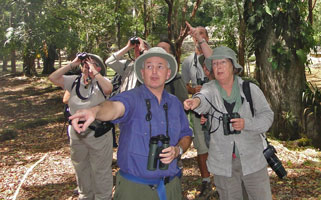Eco Tourism - The Sustainable Future of Holidays
With an ever increasing focus on sustainability, greener alternatives and cutting down the damage we collectively do to the environment, ecotourism is a great option for holiday makers and wildlife lovers that want to not only have a memorable break and enjoy natural settings, but also help reduce the global carbon footprint of the traditional tourism and holiday industry as a whole. When we think of holidaying in Europe, for example, the destinations that spring to mind are often locations in Spain, Greece, Italy, and so on. However, if you are looking for something not only a bit different to the standard package holiday, then ecotourism is worth considering. There are a number of options in Europe alone, not to mention more exotic locations in South America, that can offer a truly unique and environmentally-aware form of break.
The Current Impact of Tourism
Apart from the reasons listed above, there are wider reaching environmental problems that ecotourism can have a direct and positive impact on, and by choosing this holidaying option, you are personally contributing to these solutions. One of the main problems caused by the ever increasing global tourism market is often related to the development of tourist and holiday compounds, large hotels, and so on. While - within reason - these facilities do not pose a problem in themselves, many new developments are being constructed in locations that were not previously tourist areas. This can lead to a number of local environmental problems. Additionally, as a holiday maker, taking advantage of what ecotourism has to offer can lead to a truly unique experience. Visiting Belarus, or Poland's national parks with the wealth of bison, wolves and elks for example, gives you a degree of freedom not available in most package holidays. These forests are some of the last undisturbed primeval forests in Europe, and offer a wealth of rare bird life and environments that are unique to the region
One concern is how local water supplies are affected. In areas of the Mediterranean for example, or areas with hot climates, water consumption is often increased by tourist facilities, such as swimming pools and golf courses, but tourists themselves often end up consuming a lot of water in hot climates they are not used to. The United Nations Environmental Program, for example, suggests that tourists may consume up to 440 litres a day, which is nearly double what a local Spanish resident might consume.
Additionally, greater tourism brings with it many of the problems associated with greater populations, and often these areas are not prepared or equipped for such a large, albeit temporary, growth in the local population. This can lead to more demand for energy, causing a knock on effect to the environment as more energy must be generated, waste disposal and litter often become more of a problem, and finally the degradation of local natural environments and ecosystems.
How Ecotourism Helps, and What you can do
Ecotourism is based around some key principles that aim to ensure that any ecotourism venture has only a positive impact on local communities and their associated ecosystems and natural environments, while reducing and attempting to eliminate the negative effects that tourism can unfortunately often produce. When it comes down to what you can do personally, simply choosing an ecotourism based holiday is of course one of the better options, and there are some great ways to get hands on. Helping to create and place new nest boxes for bird species like the Roller, Hoopoe and Scops Owl is one, such example, and finding new nesting possibilities for the Red Footed and Saker Falcons can also be very rewarding. Alternatively, a butterfly holiday, where you will help count population density and restore local habitats will offer some fantastic sights of the colorful, elegant creatures, as well as helping to maintain their survival. Furthermore, introducing your friends and family to the ideas behind ecotourism can often be rewarding, and everyone’s first ecotourism experience is often a very eye opening one. You have the advantages of experiencing wildlife first hand in an untouched environment, as well as local communities that are authentic. These experiences alone can really reinforce the need for more ecotourism and the benefits it can bring. There are of course, other sustainable and environmentally friendly ways to holiday. Cruises for example, are often a good choice, as seas travel in general causes much fewer carbon emissions than air transport. Additionally, you have the benefit of experiencing a number of cities worldwide without causing additional strains on local resources. In fact, according to Iglucruise, cruise companies are tackling the sustainability of cruising head on, with many new innovations and sustainable measures being taken to ensure the environmental impact of cruising is as low as possible.
Perhaps the key thing to remember is that whether you are on a traditional holiday or an ecotour, respect for the locations you visit is paramount. Small things such as making sure you leave no litter, keep to allotted trails and paths, and finding smaller, local accommodation can often go a long way to easing the strain large scale tourism can place on communities and wildlife.


























